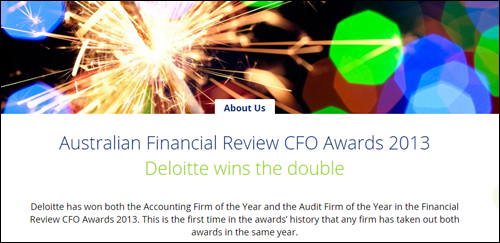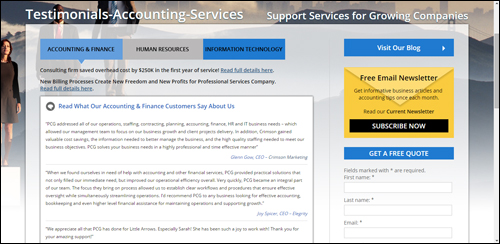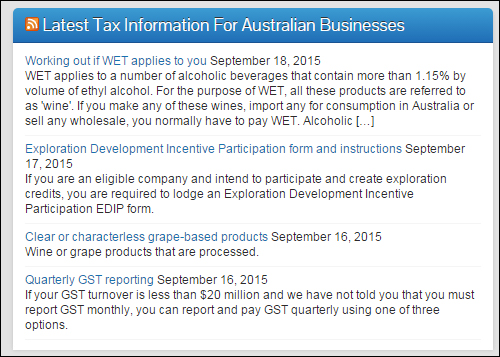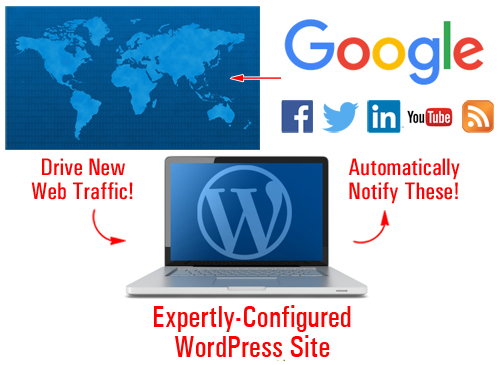Grow Your Accounting Business Online With WordPress
 The digital age has not only revolutionised business around the world, it has also created new challenges and great opportunities for the accounting profession.
The digital age has not only revolutionised business around the world, it has also created new challenges and great opportunities for the accounting profession.
Challenges Professional Accountants Face Online
Today, more than ever, accountants must work harder and find smarter ways to stand out from the crowd, obtain new business, and keep their current clientele. Not only do they have to participate in the communities and industries their business serves, they must also develop a strong presence online. This includes having a website and figuring out better ways to market your business services online.
In addition to spending dollars advertising offline on newspapers, ads in industry publications and magazines, radio and television spots, etc., you will probably find (if you haven’t already) that in order to compete with other web-marketing savvy accounting businesses, increasingly larger amounts of their budget will need to be allocated towards developing and managing a website that drives prospects, engages visitors, outranks the competition in search engines and social media, and helps you gain wider marketing exposure online.
This means that your website not only has to look professional, load fast, and be easy to navigate, but it’s also important to keep in mind that the needs of the website may change over time and some aspects will need to be updated often. This requires a well-developed web and content management strategy in place.
Another challenge that CPAs face (as most other professions do for that matter), is that your site has an average of 30 seconds or less to provide users with what they need or they will go away.
“Websites have evolved into central information hubs where service information is still present but enhanced with web portals, hyperlinks to state and federal sites, and a variety of free tools.”
Michael Alter, http://www.accountingweb.com/technology/accounting-software/tips-for-improving-your-website
Opportunities For Accountants In The Online Economy
As well as facing many new business and technology changes, there are also many online opportunities available to businesses in the accounting profession that can evolve to meet the demands of the online economy and can think progressively when it comes to marketing their services better online.
This guide will help you uncover a number of ways to increase traffic and establish online credibility for your business.
![]()
As well as providing useful website improvement tips, we also recommend that you consider using the WordPress platform to power your accounting or financial services website.
To learn more about the benefits and advantages of using the WordPress content management system, see these articles:
- Discover Why A Poorly Designed Website Can Lose You Potential Buyers
- WordPress – A Business Owner’s Guide
Tips To Improve Your Website
This section explains how to improve your website and get better results online. We will look at what web pages you need, what type of content works best for accounting websites, layout and navigation structure, etc.
If you need assistance or help planning your website, read this detailed step-by-step guide we have written: How To Plan Your Web Site - A Basic Blueprint For Business Owners
Basic Web Pages
All websites need a number of essential web pages. Let’s go over these.
Products And Services Description Page
You need a page that explains your services and any products that you offer.
It will include services such as:
- Business – business planning, incorporation of companies, general accounting, payroll, preparing financial statements, bookkeeping, forecasting, financing, budgeting, strategic planning, consulting services, etc.
- Taxation – preparation, planning, reviewing, auditing, advice, problem resolution
- Investment strategies
- Corporate accounting
- Wealth creation
- Superannuation/retirement plan (401k) advice
- Audit risk assessment and assurance
- Quickbooks – setup, training, tune up, and support
- Specialist services – mergers, acquisitions, information technology, secretarial, rentals, trusts, fiduciary accounting, succession planning, selling businesses, transfers, etc.
- Lending and leasing
Make sure to list all of the services you provide, not just the ones you specialize in. Educate your visitors about what your services do and why they should book an appointment with you.
Who We Are
The ‘About Us’ page needs to describe your business and what your business stands for, its unique approach, philanthropy, etc.
Remember to also include any awards, accreditations, recognitions, certifications, publications, associations, etc., that can be used to promote your company and position it above your competitors.

(List all of your industry awards certifications, accreditations, recognitions, associations, publications, etc. in your About page. Image source: deloitte.com)
Staff
Are you searching for quicker and simpler ways to sell more products online or get prospective clients to stay longer on your site? Then help your prospects get to know, like and trust your organization better.
You want prospects to relate to your business. One great way to do that is to have a page that introduces your employees. This page should include a photo and a brief bio. Since most visitors are probably not familiar with accounting terms your descriptions should tell who they are and what their specialties are. You may also want to explain what those specialties mean. This page should also include social buttons that will allow your prospective clients to follow selected staff members on their social pages.
On this page, don’t be afraid to show the human side of your team members with personal stories, hobbies, etc., but make sure to highlight your person’s expertise, why they are an invaluable asset to your team, and more importantly, how they can help add value to your clients’ business.

(Make sure to add a staff page. Image source: deepsky.com)
We have created a detailed tutorial about how to add a simple team members directory to your web site using a free plugin here: How To Easily Add A Simple Employee Directory To Your WordPress Site With No Coding Skills
Work With Us
List any career opportunities available within the organization. This page could include type of training provided, benefits, opportunities for advancement, social aspects of working for your organization, etc. You can also include information such as the job outlook and additional career opportunities in the accounting and financial services industry.
Also include a positions available section in your page. If there are no positions currently available, consider inviting people to return periodically to this page, join your newsletter, follow your social pages, etc.
Testimonials
Case studies and client reviews are a great way to show potential clients minimize tax, increase profitability, or grow strategically. By adding a page with case studies and testimonials from past clients, you are also helping to provide visitors social proof online.

(Add a page to your site with testimonials from past clients and case studies. Screenshot source: pcg-services.com)
If you want to learn more about using testimonials and reviews, refer to this article: Learn How To Improve Your Sales Conversions With Captivating Testimonials
Contact Page
A contact page is essential.
It should provide visitors with the following information:
- Business Name
- Physical address
- Telephone number
- Facsimile number
- Google Map and directions
- Website URL
- Contact form
- Request for more information – who to contact
- Links to social media pages
- Online chat feature
If your business operates out of multiple areas you want to make that clear when displaying your address and contact information.
You should also include links to an FAQ section, useful pages, special offers, support area, newsletter, blog, etc.
Add An Accounting Or Financial Services Blog
A blog can be a powerful marketing tool for your business. Blogs typically comprise of a content management system that allows you to easily promote your business by publishing content such as industry announcements, company updates, training articles, discussions on current topics, how-to videos, webinars, etc.
If you already have an accounting website, then consider adding a WordPress-powered blog to promote your company.
If you don’t have a website yet, or your existing accounting or financial services site is very hard to keep updated or not giving you the results you want, then WordPress can be used as both your website and your blog.
![]()
Very few businesses know that an expertly configured WordPress site can turn your web presence into an automated traffic machine that will begin driving new visitors to your business, simply by adding regular content to your web site.
(An expertly configured WordPress site can automate your traffic generation)
Go here to learn more about this: Website Traffic Blueprint – Learn How To Create An Automated Traffic-Getting Machine
Legal Info Pages
It’s essential for accounting and financial services firms to have a compliant website, not just for establishing credibility with prospective clients, but also to ensure that you are not contravening laws and regulations in whatever location you do business in.
Adding some or all of the legal pages below to your accounting or financial services site will help you stay out of legal hot water with most regulatory authorities, third-party service providers (e.g. Google), and other potential sources of threats and legal inconveniences:
- Contact Us
- Privacy Policy
- Terms And Conditions Of Use
- Website Disclaimer
- Affiliate Agreement
- Anti-Spam Policy
- Compensation Disclosure
- DMCA Notice
- Earnings Disclaimer
- External Linking Policy
- Health Disclaimers
- Refund Policy
- Video/Audio Terms
- etc.
We have written a comprehensive article about adding legal pages to your site. Go here to learn more about this: What You Need To Know About Adding Legal Pages To Your Site
Tips For Improving The Content On Your Site
In today’s globally competitive economy, the ability to deliver valuable content to visitors at no cost has become one of the key success factors for businesses selling similar products or providing similar services.
Providing great content with information and tips will get your readers to share your web pages online and come back for more. This is the most effective way to inform and educate your visitors and prospective clients about your business.
For example, for an accounting or financial services business, topics can cover:
- How balance sheets work
- Understanding profit & loss statements
- Directors’ duties and legal responsibilities
- How to present accounts for non-profit activities
- Cashflow planning tips
- Maximizing business insurance cover
- Risk prevention
- How to structure a self-managed retirement fund
- Things to look for when … (e.g. purchasing vs leasing, claiming business expenses, etc.)
You can also create a series of educational articles that will help your your readers understand your accounting services, such as software accounting, business accounting, tax planning for small business, reducing debt, understanding accounting concepts, etc.
Remember to use relevant keywords in your articles that your readers will be searching for.
![]()
We recommend subscribing to our Content Marketing Email Training Series. You will receive a comprehensive series of training emails with easy-to-digest information and practical tips that will teach you how to drive more traffic to your website or blog, save money creating high-quality content for your site visitors and grow your business online using content marketing. It’s not only a great course with loads of useful information, it’s also 100% FREE!
Ways Of Improving Visitor Engagement And User Experience
Improving your website’s user experience (typically referred to as UX) helps to keep visitors coming back and using your site. This section will show you different ways to improve your visitor engagement and UX.
Use RSS Feeds
RSS feeds provide many benefits for your website.
If you provide valuable information, other businesses will want to syndicate your content.
Some of the benefits of syndicating your content to other businesses using RSS feeds, include:
- All of your updates are in one place
- Content distribution doesn’t rely on email
- Feeds can be shared
- Feeds allow users to subscribe
- An RSS feed provides links to your content
- Your feeds can be submitted to RSS directories and aggregator services
- There are various ways your readers can receive your content (e.g. subscribers can read your content on their mobile device using feed readers)
- It’s built into WordPress
There are also a number of benefits to providing information on your site from other sites, such as the fact that you don’t have to write, manage or update the content.
To find useful RSS feeds for your website, visit sites of tax-related government departments and well-known industry bodies.
For example, here are some exaples of useful RSS feeds you may want to add to your accounting website:
- Taxation Policy Center: http://www.taxpolicycenter.org/press/rss.cfm
- Australian Taxation Office: https://www.ato.gov.au/RSS-news-feeds.aspx
- Canada Revenue Agency: http://www.cra-arc.gc.ca/rssfeeds/
- UK HM Revenue and Customs: http://www.hmrc.gov.uk/rss/rss.htm
- South Africa Revenue Service: http://www.sars.gov.za/Pages/RSS-Feeds.aspx

(Use RSS (Really Simple Syndication) feeds to improve your site’s user experience.)
Adding Online Forms
Checklists and forms are a fantastic way to increase visitor engagement and add value to your visitors. Checklists and forms can provide visitors with useful step-by-step instructions and resources to perform a necessary task. Forms and checklists are also great business planning tools.
Forms and checklists could include subjects such as:
- How To Set Up A Company
- Rental Property Checklist
- Fundraising Governance Checklist
- Disclosure Requirements
- Company Tax Checklist
- Trust Tax Checklist
- Income Tax Variation Forms
Unique Tools
Providing unique online tools and applications for businesses can help increase visitor engagement and add significant value to your potential clients. Calculators, such as loan and tax calculators, are great tools to add to accounting websites. Other applications would include time cards, or retirement and interest calculators.
In the next section of this detailed article, we take a look at a number of WordPress plugins you can use in your site that can help to improve your seo, increase user engagement and drive more traffic to your business.

***
This is the end of section 1.
To continue reading, click this link:
![]()
Get Notified When New Tutorials Are Published – Subscribe To Our Site!
***
***
"Learning WordPress has been a huge stumbling block for me. I've been looking for something that covers absolutely everything but doesn't cost an arm and a leg. Thank you so much ... you have just provided me with what I have been looking for! Truly appreciated!" - Tanya
***
